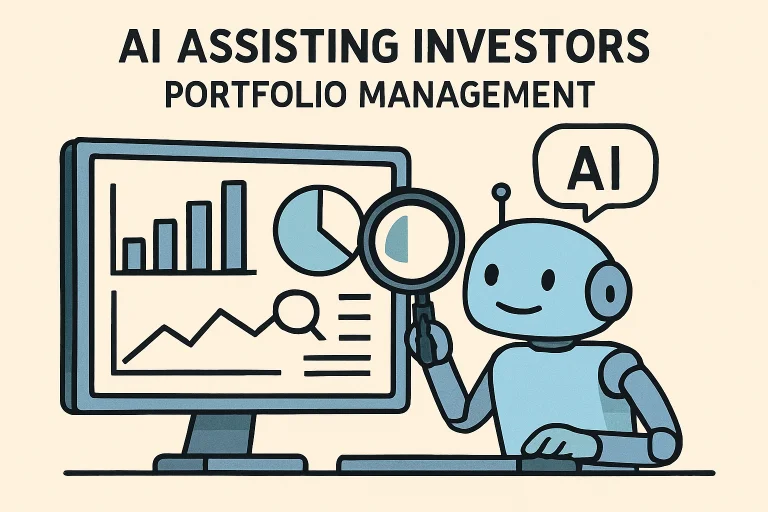Key Takeaways
- Artificial Intelligence (AI) is revolutionizing portfolio management by enhancing data analysis, risk assessment, and decision-making processes.
- AI-driven tools offer personalized investment strategies, real-time market monitoring, and automated portfolio rebalancing.
- Investors should be aware of the challenges and ethical considerations associated with AI in investment management.
Uncover insights you missed—tap to read a related post deepening your understanding.
Introduction
The financial industry is experiencing a transformative shift as modern investors seek more effective ways to manage their portfolios. Increasingly, markets with their vast information streams and rapid changes- require agile, data-driven strategies. Artificial Intelligence (AI) has emerged as a powerful ally for investors seeking an edge, optimizing outcomes, and navigating risk with precision. AI in investment management offers a new generation of tools and insights, reshaping the traditional approach to portfolio building and rebalancing says Balanced Solutions.
AI systems leverage massive datasets, machine learning, and intuitive algorithms to generate actionable intelligence that would be impossible for human analysts to replicate at the same speed and scale. For investors, this advancement translates into more informed decisions, timely interventions during market volatility, and access to strategies previously limited to institutional players. The adoption of AI across the investment landscape has led to significant enhancements in risk evaluation, personalized investment solutions, and dynamic market responsiveness. As the technology evolves, so do the opportunities and complexities for investors seeking to capture market gains while managing uncertainties. With benefits come important responsibilities: understanding the nuances of AI technology, ethical considerations around data and automation, and the risks inherent to relying on algorithmic decision-makers are all critical for ensuring that these advanced tools drive long-term value.
The Role of AI in Portfolio Management
AI’s role in portfolio management centers on integrating machine learning, predictive analytics, and real-time data analysis into a cohesive strategy. This means portfolio managers and individual investors can swiftly assess risk across diverse assets, uncover investment opportunities, and proactively react to market developments. Many leading financial firms are now employing AI-powered robo-advisors, smart beta ETFs, and alternative data sources to expand their analytical capabilities.
Benefits of AI in Investment Strategies
- Enhanced Data Analysis: AI systems can process enormous amounts of structured and unstructured data, including market histories, economic indicators, financial news, and even social sentiment. This level of data mining yields more comprehensive market intelligence, enabling investors to identify trends faster than traditional methods.
- Risk and Return Optimization: Algorithms evaluate historical asset correlations, performance trajectories, and macroeconomic shifts to recommend strategies that balance potential returns with appropriate levels of risk, reducing the likelihood of costly missteps.
- Personalized Investment Plans: AI tools analyze each investor’s risk tolerance, financial objectives, and time horizons to construct portfolios tailored to their unique profiles, allowing for fully customized approaches as market conditions and personal needs evolve.
Real-Time Market Monitoring and Automated Rebalancing
One of the standout advantages of AI in portfolio management is its ability to monitor markets continuously. Advanced AI solutions monitor assets, indices, and economic indicators in real time, identifying signals of volatility, trend reversals, and emerging investment opportunities. When markets shift unexpectedly, these systems automatically rebalance portfolios, ensuring adherence to the investor’s desired allocation and risk level. This automation reduces emotional decision-making and guards against missed opportunities during rapid fluctuations.
Challenges and Ethical Considerations
Adopting AI-driven solutions does come with challenges. Issues around data privacy, the opaqueness of certain algorithmic models, and the potential for embedded biases in training data are prominent. If not carefully managed, these factors can result in decisions that do not align with investors’ best interests. Moreover, there’s a risk of over-reliance on automation, which can cause investors to overlook critical human judgment or ignore market nuances that AI might miss. Ensuring transparency, fairness in algorithmic processing, and regular review of AI outputs is crucial for responsible adoption.
Case Studies: AI in Action
There are several notable examples of AI’s impact in the investment world. Evolve Funds Group Inc., for instance, offers an AI-powered ETF that uses machine learning to select optimal equity positions by analyzing an expansive array of performance and risk metrics. Similar approaches are being replicated by major institutions and boutique asset managers alike, showcasing AI’s ability to both democratize and elevate sophisticated investment strategies. As these case studies demonstrate, AI platforms are no longer the sole domain of tech giants or hedge funds; they’re accessible to a growing class of retail and institutional investors.
Future Outlook
The rapid pace of technological advancement suggests AI’s role in portfolio management will only deepen. Next-generation platforms are experimenting with natural language processing for real-time news sentiment analysis, blockchain integrations, and quantum computing frameworks to maximize forecasting power. Investors can expect a growing array of tools designed to synthesize and act on global financial signals, bringing even greater customization, risk management, and efficiency to their investment experience.
Conclusion
The integration of AI into portfolio management is reshaping the modern investment landscape. Through superior data analysis, personalization, and real-time adaptability, these technologies offer a sharper, more responsive approach than ever before. However, realizing the full potential of AI means grappling with thorny questions around ethics, transparency, and risk ensuring that this powerful technology is used for the sustainable benefit of investors and markets alike.
Don’t miss what’s trending—dive into our featured post packed with valuable insights.






